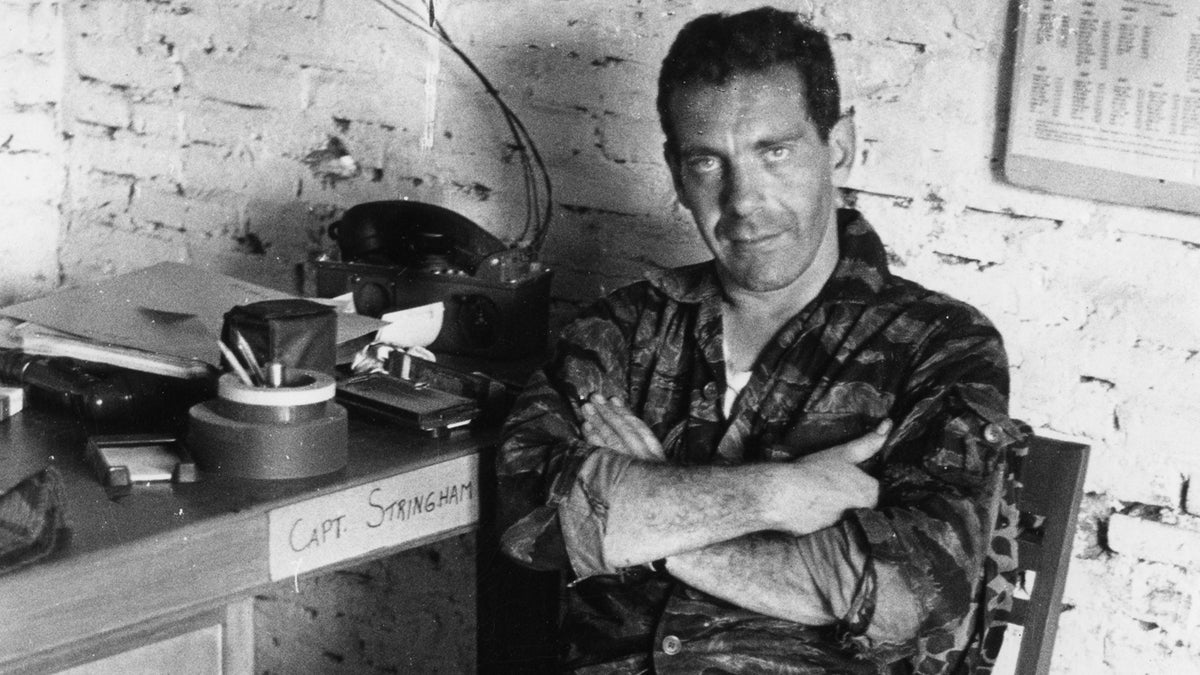Morley Safer would know how to cover Trump

This 1965 image released by CBS shows newsman Morley Safer while on assignment in South Vietnam. Safer
Morley Safer, who died yesterday, was not always an avuncular old guy on “60 Minutes.” He made his bones 51 years ago in Vietnam, by exercising the kind of news judgment that today’s journalists would do well to emulate in this dire year of Donald Trump.
At CBS News back in the day, Vietnam was known as “Morley Safer’s War” – with good reason, because he helped change the journalistic paradigm. Pre-Safer, the war correspondents typically adhered to the false equivalence standards of “objective” reporting: On the one hand, the commies did something bad; on the other hand, the U.S. military did something good – with a tilt toward the latter, because the correspondents typically favored their American government sources. It was the patriotic thing to do.
But on Aug. 5, 1965, Safer broke the rules. He was a newbie, out on patrol with Marines who were marching to a village called Cam Ne. On the way, a lieutenant told Safer that the soldiers were going to tear the village up because they’d taken a lot of fire from that location (a reason that later turned out to be false). And that’s what happened. Safer and his cameraman watched as the Marines set fire to all the civilians’ hutches, using their Zippo lighters, and literally burned the village to the ground. The pleas of the old men and women, who sought to at least save their belongings and rice supplies, were ignored. The Marines could afford to be methodical, because there was no enemy fire.
Safer had to make a decision. Should he wait and get the official word, back at military headquarters, about the nature of this mission? Or should he report on what he had just seen with his own eyes? He chose the second option. From his report, which reached the America’s living rooms:
All around the common paddy fields, a ring of fire. One hundred and fifty homes were leveled…In Vietnam, like everywhere else in Asia, property, a home, is everything. A man lives with his family on ancestral land. His parents are buried nearby….Today’s operation shows the frustration of Vietnam in miniature. There is little doubt that American firepower can win a military victory here. But to a Vietnamese peasant whose home means a lifetime of backbreaking labor, it will take more than presidential promises to convince him that we are on his side.
Safer’s editors in New York and Washington had to sign off on the story – American boys as heartless aggressors? really? – but the footage was the footage. Safer’s report hit with the force of a bomb. It’s easy to forget that, back in 1965, television was a game-changing technology; in that era, it was just as transformative as social media is today. It conveyed images directly to the public, bypassing the traditional government gate-keepers.
So it was no surprise that when President Lyndon Johnson saw the CBS report, he went bat-crazy. Early the next morning, he called CBS President Frank Stanton.
“Frank,” he said, “are you trying to f— me?”
“Who is this?” said a sleepy Stanton.
“Frank, this is your president, and yesterday your boys shat on the American flag.”
LBJ followed up by ordering an investigation into whether Safer was a communist. The only evidence that turned up revealed that Safer was a Canadian. When informed of that fact, LBJ reputedly replied, “Well, I knew he wasn’t an American.”
Meanwhile, CBS News got hammered by the trolls of that era – right-wing denialists who refused to believe the visual evidence they saw with their own eyes, who insisted (without evidence, natch) that the footage was faked, that American boys would never burn down a village. Safer got death threats and slept in Vietnam with a loaded 9mm pistol.
Long after, Safer talked about his decision to ignore the false-equivalence rules and the reliance on official sources. The Marines actually tried to deny the Zippo torchings – “it was just blatant bullshit, and that’s an example of what really drove me crazy in Vietnam.” Mostly, he talked about the story’s impact back home: “To see young G.I.s, big guys in flak jackets, lighting up thatched roofs, and women holding babies running away, wailing – this was a new sight to everyone, including the military, I suspect.”
And David Halberstam, the famed Vietnam war correspondent, later wrote about what Safer had wrought: “Now there was a greater receptivity to considering darker news about Vietnam, and to sensing that, despite all the fine words of all the public relations men that the Defense Departent and the President employed, and all the fine posturings of high Administration officials on ‘Meet the Press,’ there was something wrong going on out there.”
Which brings us to Donald Trump. There is something wrong going on out there.
An authoritarian demagogue with no policy creds is closer to the presidency than ever before, and we in the press have a responsibility to ditch false equivalence and state what we see with our own eyes. Trump is threatening to torch this democracy with a Zippo, and that fundamental truth must be reported, without fake “objectivity” filters. That’s how Morley Safer would handle it.
——-
Follow me on Twitter, @dickpolman1, and on Facebook.
WHYY is your source for fact-based, in-depth journalism and information. As a nonprofit organization, we rely on financial support from readers like you. Please give today.

